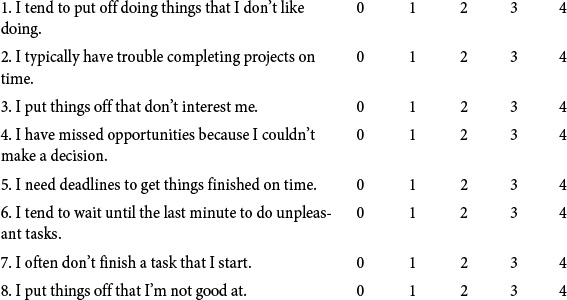
The following lists eight actions that may or may not describe you. For each, circle your responses using the following five-point scale:1
0 = Not at all
1 = Sometimes
2 = Moderately often
3 = Often
4 = All of the time

Add up your responses to the eight items. Your score will fall somewhere between 0 and 32. The higher your score, the more you’re prone to procrastinate.
Scores of 8 or less suggest you don’t delay decisions or life activities. Scores of 22 or higher, on the other hand, indicate you may be prone to postpone doing things and experience frustrations over actions not taken.
Procrastination is a tendency to postpone, delay, or avoid performing tasks or making decisions.2 In some situations, procrastination can be positive.3 For instance, if you lack sufficient information to make an informed decision, if other pressing matters with higher priorities demand attention, or if the consequences of a decision are so weighty that more deliberation is needed, procrastination is likely to reduce the chances of making a bad decision. But chronic procrastination can lead to lost opportunities, regrets, and other negative outcomes.
As I elaborate on in Chapter 14, “Never Do Today That Which You Can Do Tomorrow: The Inertia Bias,” high procrastinators are likely to have trouble making minor decisions (“I know I should clean out my closets but...”) as well as major decisions (“I want to get married, but I’m not sure if now is the right time”). For many people, procrastination consistently hinders them from taking actions and changing things in their lives, but low scores on this test also may indicate problems. Low procrastinators often act prematurely and later regret their actions. A little procrastination, particularly on important decisions, may save you a lot of money and aggravation.